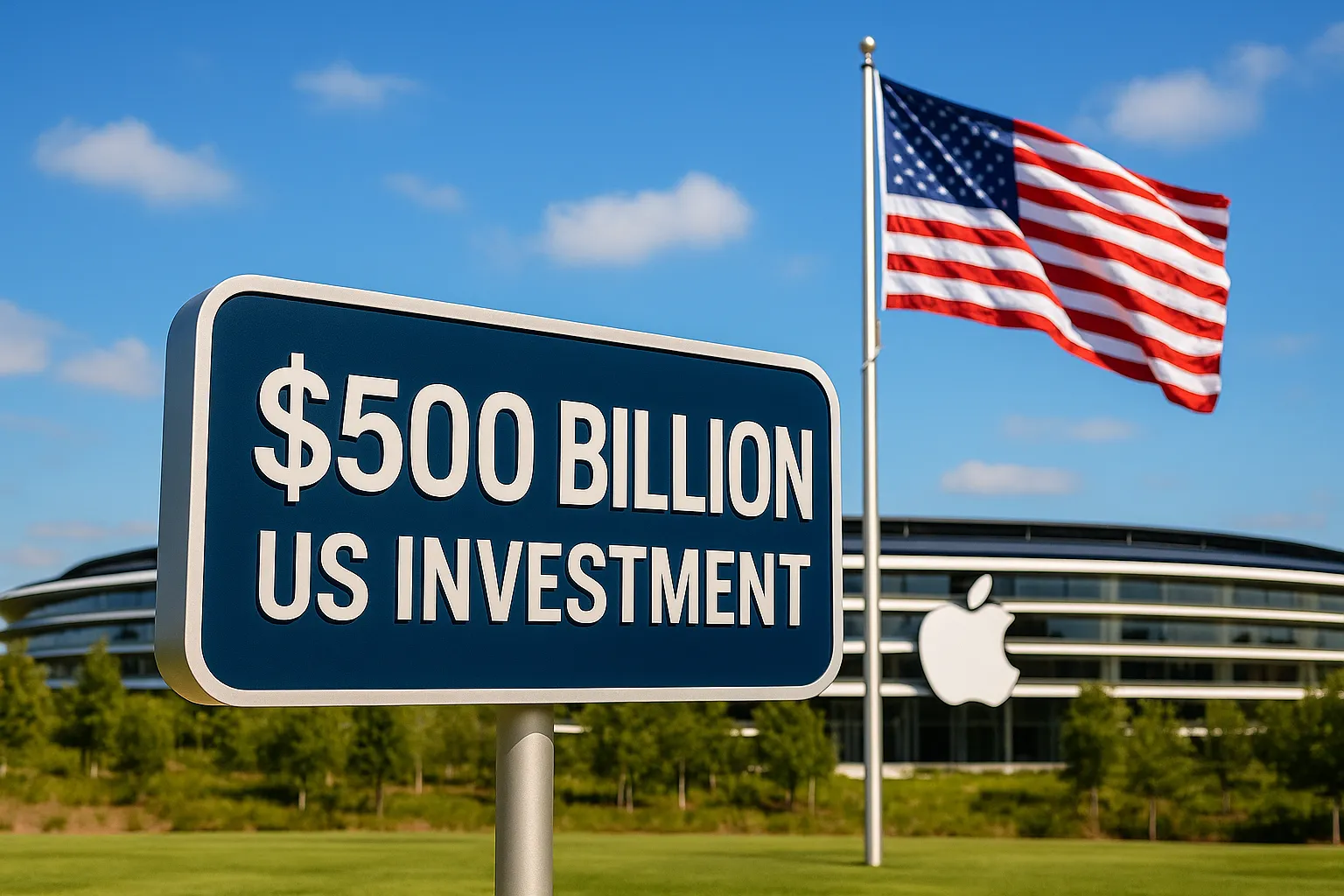The Apple US investment is being hailed as patriotic genius: $500 billion pledged for America over the next four years. Factories in Houston, research in Detroit, artificial intelligence labs from coast to coast. Politicians wave flags, headlines cheer, and investors smile. But beneath the polished press releases lies a different truth. This is not philanthropy. This is corporate survival, dressed up as patriotism.
Context: what Apple promised
Apple announced in August 2025 its largest ever domestic investment plan. The company promised $500 billion in capital projects, job creation, research, and artificial intelligence. The package includes a new semiconductor hub in Texas, R&D centers in Detroit, and a broad expansion of Apple’s so-called “Apple Intelligence” ecosystem.
At first glance, this looks like an empire returning to its homeland. Yet context matters. Apple is not rediscovering love for America. It is adapting to a world of geopolitical fragmentation, rising tariffs, and growing suspicion of Big Tech.
Hero image alt text: apple us investment
The mainstream narrative: Apple saves America
The official narrative is glowing. Apple is portrayed as the savior of American industry. Politicians frame the plan as evidence that corporate America is “coming home.” Apple executives talk about values, responsibility, and jobs. Analysts speak of a technology renaissance, a new golden age of American innovation.
The mainstream loves this story because it sells hope. It makes America feel competitive again. It tells a tale of corporate patriotism, of Silicon Valley riding to rescue a fractured economy.
But is this really what is happening?
Oppositional argument: survival, not sacrifice
Let us be clear. Apple did not suddenly develop a conscience. It faced pressure. Rising tariffs under the Trump administration threatened its Asian supply chains. The US government hinted at stricter regulations, antitrust lawsuits, and even taxes targeting foreign production. China, meanwhile, has been building its own Apple competitors, pressuring the company out of its once secure market.
Faced with these threats, Apple chose the lesser evil: to wrap self-interest in the flag. The $500 billion pledge is a shield. It buys political protection, softens antitrust rhetoric, and secures subsidies. Patriotism is the story. Survival is the motive.
Analytical breakdown: where the money goes
Let us dissect the Apple US investment.
- Semiconductors in Texas: Apple will funnel billions into a Houston-based chip plant. Why? Because reliance on Taiwan is too risky in the age of US-China tensions. Apple is insuring itself against war in the Taiwan Strait.
- Detroit R&D: Apple presents this as charity for a struggling city. In reality, it is a strategy to tap into automotive AI research, especially for autonomous systems. Detroit offers talent pools at lower cost than Silicon Valley.
- Apple Intelligence expansion: Billions are earmarked for AI. The aim is not simply to build features, but to dominate the AI landscape before Microsoft, Google, or Chinese competitors do.
Every line of the plan reads less like patriotism and more like battlefield preparation.
Human perspective: jobs and workers
Workers are told to celebrate. New jobs, new opportunities, new hope. But history warns us. Apple’s supply chain record is built on outsourcing, contract labor, and pressure on margins. Many of these jobs will be temporary construction contracts. Others will be high-skill research roles, not accessible to average Americans.
Communities in Detroit and Houston may benefit, but the scale is smaller than the headlines suggest. Meanwhile, outsourcing to Asia will not disappear overnight. Apple’s empire still rests on cheap production abroad. The jobs narrative is as much illusion as reality.
Counterarguments: Apple as innovator
Some argue Apple’s plan proves its commitment to American renewal. Others say it will truly spark innovation and lift entire regions. There is truth here. Investment will create some jobs and new labs. It may drive local economies in Detroit and Texas. It will expand America’s footprint in artificial intelligence.
But these positives do not cancel the deeper truth: Apple is acting to protect itself. It is not risking profit for patriotism. It is securing future profits by adapting to political winds.
Conclusion: empire first, nation second
The Apple US investment is impressive on paper. $500 billion dazzles. The headlines inspire. Yet when stripped of PR polish, it looks less like charity and more like calculation. Apple is not saving America. It is saving Apple.
This is the empire’s true motive: to survive in a fractured world, to dominate artificial intelligence, to secure supply chains against global shocks. America benefits only because Apple has no other choice.
The real test is not the size of the pledge. It is whether workers in Detroit or engineers in Houston will see lasting gains. If not, this $500 billion will be remembered not as patriotism, but as the greatest corporate insurance policy of the century.
External references:
Apple Wikipedia, Economic Times.
115 views